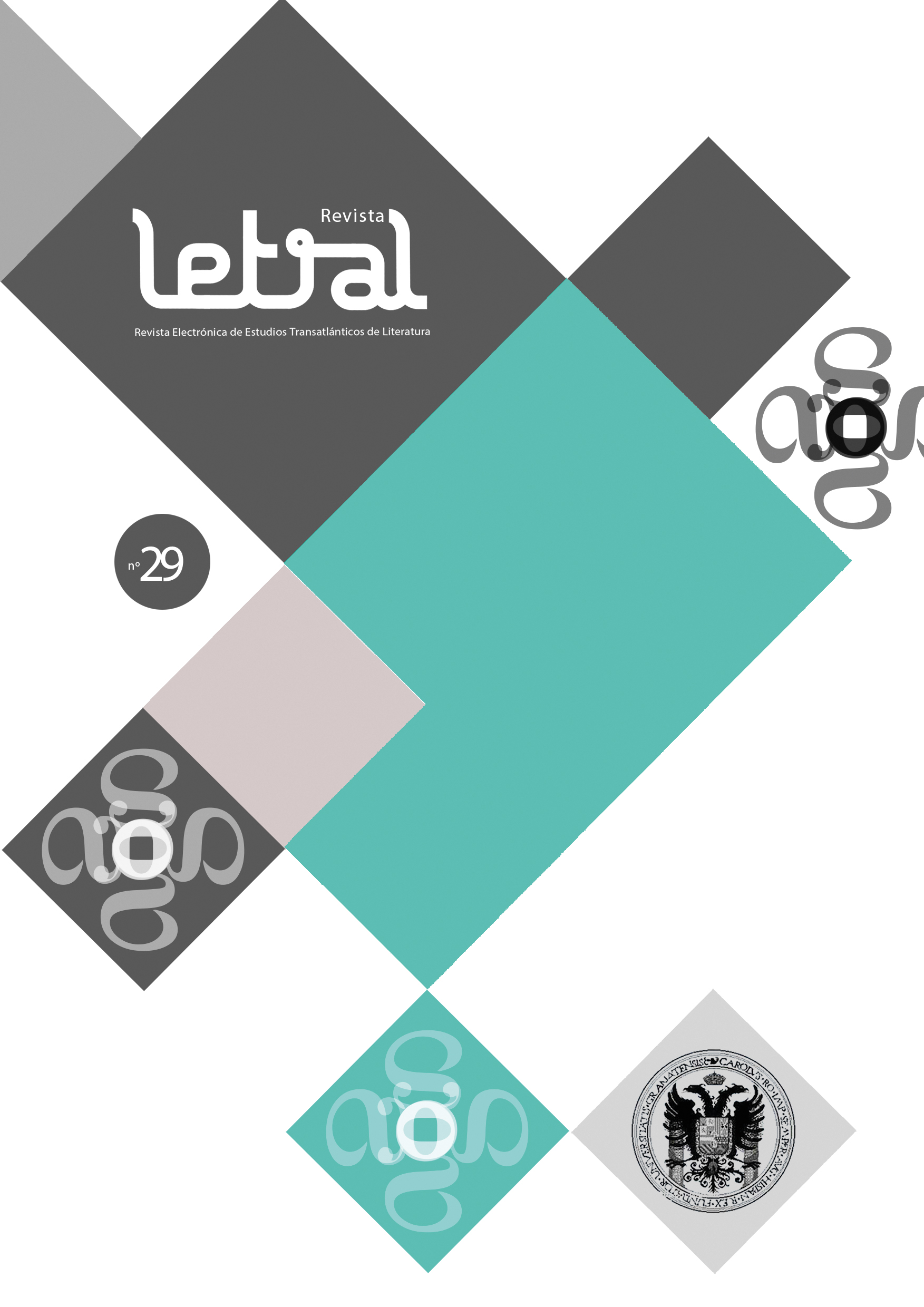Danzando entre las categorías de bastardía, perplejidad y complejidad: migraciones y ascendencia en Huaco retrato (2021) de Gabriela Wiener
DOI:
https://doi.org/10.30827/rl.vi29.24398Palabras clave:
migraciones, ascendencia, diálogos feministas, conocimientos situadosResumen
En Huaco retrato (2021) Gabriela Wiener presenta una articulada propuesta sobre las heterogéneas interpretaciones de diferentes narraciones migratorias, entrelazando las mismas con la búsqueda de las memorias familiares y las ascendencias. Las perspectivas descolonial y feminista permean esta reconstrucción, brindando la posibilidad de reflexionar, a través de las re-significación y aplicación de las categorías de bastardía, perplejidad, y complejidad, sobre las múltiples consecuencias de la colonización, que abarca desde el ámbito territorial hasta el epistemológico, perpetrado por diferentes estados europeos en el mundo, y concretamente en América Latina. Esta obra literaria, analizada desde un marco feminista, se presenta como una cajita de música mágica, que, a través del baile entre las categorías mencionadas, abre la posibilidad de una construcción de diálogos, que desafían lo imposible, entre las infinitas declinaciones del yo, la construcción de las alteridades y la existencia y persistencia de impostores en nuestro propio ser.
Descargas
Citas
Anzaldúa, Gloria. Borderlands. La Frontera. The New Mestiza. San Francisco, Aunt Books Lute, 1987.
Bordín, Elisa; Bosco, Stefano (ed.). A fior di pelle. Bianchezza, nerezza e visualità. Verona, Ombre Corte, 2017.
Butler, Judith. “Endangered/Endangering: Schematic Racism and White Paranoia”. Reading Rodney King/Reading Urban Uprising. Gooding-Williams Robert (eds.), New York, Routledge, 1993, pp. 15-22.
Butler, Judith. Deshacer el género. Barcelona, Paidós, 2006.
Butler, Judith. El género en disputa. Barcelona, Paidós, 2007.
Butler, Judith. Mecanismos psíquicos del poder. Teorías sobre la sujeción. Madrid, Ediciones Cátedra, 2011.
Butler, Judith. Notes Towards a Performative Theory of assembly. Cambridge, Harvard University Press, 2015.
Fanon, Frantz. Pelle nera, maschere bianche. Il nero e l’altro. Milano, Tropea, 1996.
Fanon, Frantz. I dannati della terra. Torino, Einaudi, 2000.
Galindo, María. Feminismo bastardo. La Paz, Mujeres Creando, 2021.
Haraway, Donna. “Situated Knowledges: The Science Question in Feminism and the Privilege of Partial Perspective”, Feminist Studies, vol. 14, n. º 3, 1988, pp. 575-599.
Harding, Sandra. Feminism and Methodology. Indiana, Indiana University Press, 1987.
hooks, bell. Afán. Raza, género y política cultural. Madrid, Traficantes de Sueños, 2021.
Lukić, Jasmina; Sánchez Espinosa, Adelina. “Feminist Perspectives on Close Reading”. Theories and Methodologies in Post-graduate Feminist Research: Researching differently. Buikema, Rosemarie; Griffin, Gabriele; Lykke, Nina (eds.), London, Routledge, 2011, pp. 105-118.
Meloni, Carolina. Feminismos fronterizos. Mestizas, abyectas y perras. Madrid, Kaótica Libros, 2021.
Mignolo, Walter; Palermo, Zulma (eds.), Arte y estética en la encrucijada descolonial. Buenos Aires, Ediciones del Signo, 2009.
Mohanty, Chandra Talpade. “Under Western Eyes: Feminist Scholarship and Colonial Discourse”. Feminist Review, vol. 30, n. º 1, a1984, pp. 61-88.
Mohanty, Chandra Talpade. Feminism Without Borders. Decolonizing Theory, Practicing Solidarity. London, Duke University Press, 2003.
Monticelli, Rita. “Identità e differenza: teorie critiche negli studi di genere e post-coloniali”, Interculture,vol. 6, n. º 2 , 2006, pp. 101-126.
Monticelli, Rita. “Utopie, Utopisme, Féminisme". Histoire transnationale des utopies littéraires et de l'utopisme. Fortunati, Vita; Raymond, Trousson (eds.), Paris, Honoré Champion, 2008, pp. 1127 – 1143.
Preciado, B. Paul. Un apartamiento en Urano. Crónicas del cruce. Barcelona, Anagrama, 2019.
Revelles-Benavente, Beatriz; González Ramos, Ana M., (eds.). Teaching Gender. Feminist Pedagogy and Responsibility in Times of Political Crisis. New York, Routledge, 2017.
Rich, Adrienne. Blood, Bread and Poetry. Selected Prose. 1979-1985. London, Norton Company, 1986.
Said, Edward Wadie. Orientalism. New York, The Vintage Book, 1978.
Sayad, Abdelmalek. La doble ausencia: De las ilusiones del emigrado, a los padecimientos del inmigrado. Barcelona, Anthropos, 2011.
Sousa, Villada, Camila. El viaje inútil. Transescritura. Segovia, La uÑa RoTa, 2021.
Spillers, Hortense. “Mama's Baby, Papa's Maybe: An American Grammar Book”. Diacritics. A Review of Contemporary Criticism, vol. 2, n. º 17, 1987, pp. 65-81.
Spivak, Gayatri Chakravorty. “Can the Subaltern Speak?”. Marxism and the Interpretation of Culture. Cary, Nelson; Lawrence, Grossberg (eds.). Basingstoke, Macmillan Education, 1988, pp. 171-213.
Spivak, Gayatri Chakravorty. Death of a Discipline. New York, Columbia University Press, 2003.
Spivak, Gayatri Chakravorty. “Close reading”. The Humanities in Human Rights: Critics, Language, Politics, vol. 121, n. º 5, 2003, pp. 1608-1617.
Spivak, Gayatri Chakravorty. “Three Women's Texts and a Critique of Imperialism”. Critical Inquiry, vol. 12, n. º 1, 1985, pp. 243-261.
Walker, Alice, In Search of Our Mothers’ Gardens. London, The Women’s Press, 1984.
Wiener, Gabriela. Huaco retrato. Barcelona, Penguin Random House, 2021.
Descargas
Publicado
Cómo citar
Número
Sección
Licencia
Revista Letral es una publicación de acceso abierto e inmediato totalmente gratuita, tanto para quien lee como para quien publica. Los autores y las autoras no pagan ningún tipo de tasa por el proceso editorial de sus artículos. Permitimos la lectura, descarga, copia, distribución, impresión, búsqueda, enlace o reutilización con fines no comerciales de todos los trabajos publicados, siempre que se citen la autoría, la revista y el órgano editor. Recomendamos encarecidamente la difusión de los artículos en redes sociales (Facebook, Twitter, LinkedIn, etc.) y científicas (ResearchGate, Academia.edu, etc.), repositorios institucionales universitarios y otros repositorios públicos, blogs y webs personales o institucionales, Google Scholar, ORCID, ResearchID, ScopusID, etc. En cualquier caso, la propiedad intelectual de los artículos y los posibles derechos económicos derivados de ellos son exclusivamente de sus autores.














